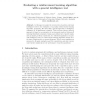Free Online Productivity Tools
i2Speak
i2Symbol
i2OCR
iTex2Img
iWeb2Print
iWeb2Shot
i2Type
iPdf2Split
iPdf2Merge
i2Bopomofo
i2Arabic
i2Style
i2Image
i2PDF
iLatex2Rtf
Sci2ools
132
click to vote
CAEPIA
2011
Springer
2011
Springer
Evaluating a Reinforcement Learning Algorithm with a General Intelligence Test
In this paper we apply the recent notion of anytime universal intelligence tests to the evaluation of a popular reinforcement learning algorithm, Q-learning. We show that a general approach to intelligence evaluation of AI algorithms is feasible. This top-down (theory-derived) approach is based on a generation of environments under a Solomonoff universal distribution instead of using a pre-defined set of specific tasks, such as mazes, problem repositories, etc. This first application of a general intelligence test to a reinforcement learning algorithm brings us to the issue of task-specific vs. general AI agents. This, in turn, suggests new avenues for AI agent evaluation and AI competitions, and also conveys some further insights about the performance of specific algorithms.
Artificial Intelligence | C Algorithms | CAEPIA 2011 | Intelligence Tests | Universal Intelligence |
Related Content
| Added | 13 Dec 2011 |
| Updated | 13 Dec 2011 |
| Type | Journal |
| Year | 2011 |
| Where | CAEPIA |
| Authors | Javier Insa-Cabrera, David L. Dowe, José Hernández-Orallo |
Comments (0)

